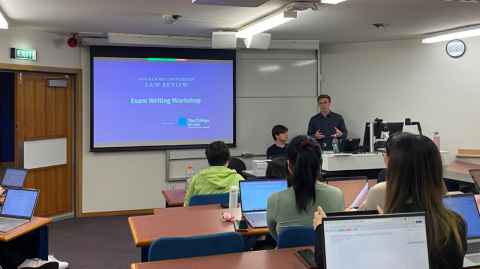Auckland University Law Review
The Auckland University Law Review (AULR) is one of New Zealand’s leading student law journals. The one issue per year is available in print and via the HeinOnline, Informit and Thomson Reuters databases.

The Review plays an important role in the Law School each year by publishing outstanding student research, upskilling up to 30 editors and a formidable business team, and running various events that form part of the Law School’s annual calendar.
The Review’s alumni have gone on to become distinguished members of the judiciary, academic and legal profession.
Although the Review has maintained many similarities from its first volume, it has grown and developed considerably in its subsequent 57 years.
Moana Pasifika Issues Paper
The Moana Pasifika Issues Paper is a section of the Review that was established in 2021 to give space to Pasifika legal scholarship, an area which is not often featured in traditional law journals. Although the section is not exclusive to authors of Pacific descent, the Moana Pasifika section hopes to better achieve the Review’s purpose of providing all undergraduate students with a platform to further the discussion of significant legal issues.
Thies Moran-Vaihū wrote the inaugural article in this section, in which she analysed the tabooing over time of tātatau (traditional Tongan tattooing) as part of the wider erasure of Tongan culture by the Wesleyan Methodist Church. Last year’s Moana Pasifika article, written by Emma Kerr, argued for the elevation of marginalised and colonised voices in the development of international climate change law.
This year's Editors-in-Chief are delighted that the Moana Pasifika section in the 2023 volume will feature two authors, one Pākeha and one Pasifika, who together engage in a race-conscious critique of Australian and New Zealand Government policy.
Workshops
This year, the Review has initiated a new workshops initiative, with its Editors-in-Chief hosting four academic workshops throughout the year, kindly sponsored by the College of Law. The workshops aim to share with the wider student body some tips, tricks and techniques that the Review is known for.
The first workshop covered exam writing, with a particular focus on helping first-year law students transition from what is expected of them at school to what is expected of them at law school. Later workshops will cover legal research, argument, editing and referencing. Much of the workshop content integrates well with compulsory LLB components such as LAW 298, prominent course assessments, as well as extracurricular activities such as mooting competitions.
It is hoped that these workshops will make the Review more prominent and accessible to all students. The Review prides itself on being a goal that many students strive to reach, either as a member of our editor or business teams, or as a published author.
Māori Editors
The Review’s first article in its first volume was a contribution to Māori legal scholarship, namely the fragmentation of Māori legal scholarship. The Review has regularly published articles concerning Māori legal issues since 1978. In 1996, the Review formally established the Ko Ngā Take Ture Māori section of the journal, and had Māori Editors from 1996 to 2004.
The year of 2023 has seen the re-introduction of the Māori Editor positions, which has helped the Review ensure its articles and editing process is culturally competent.
Christian Poland and Nathan Pinder, Editors-in-Chief
